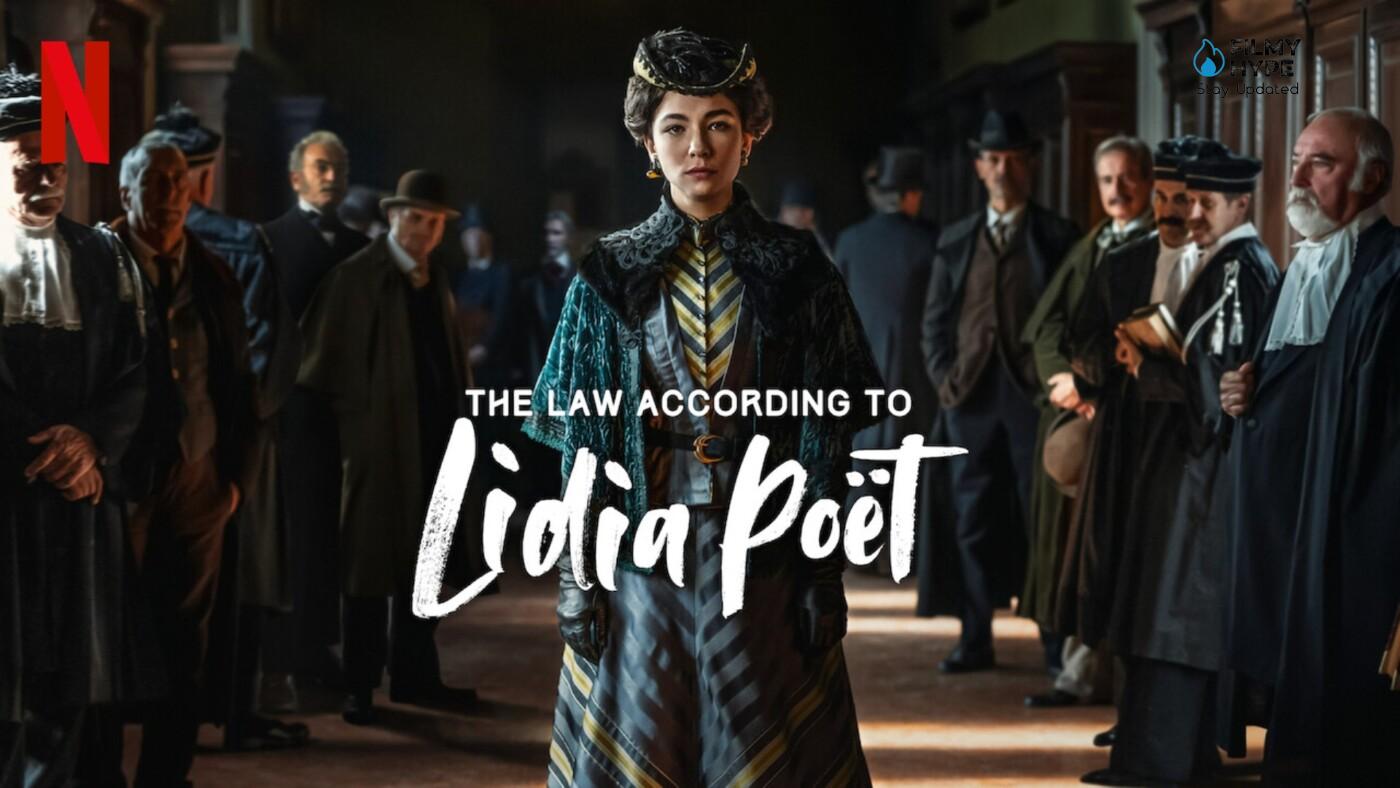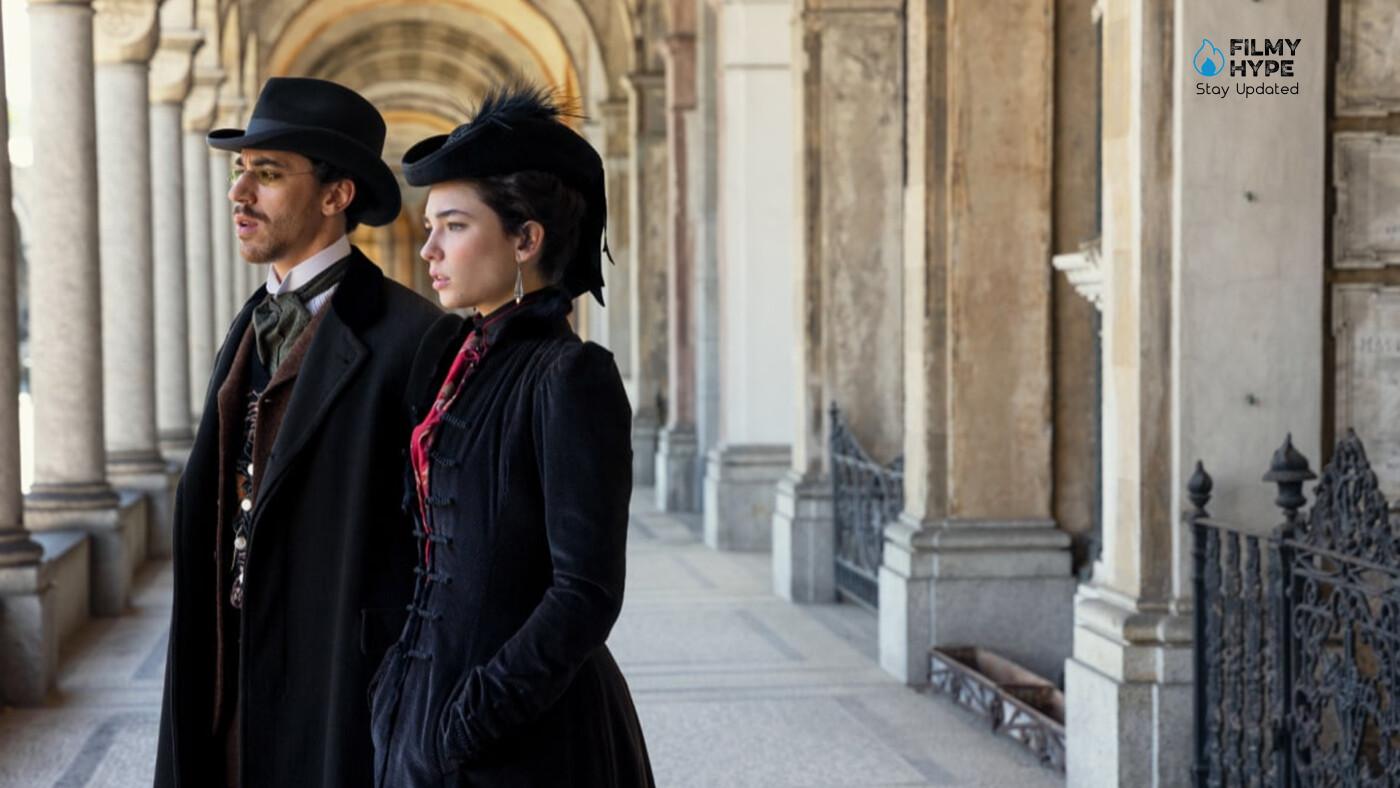The Law According to Lidia Poët Review: The Modern Woman Of The Past Who Changed The Present
Cast: Matilda De Angelis, Eduardo Scarpetta, Pier Luigi Pasino, Sara Lazzaro, Sinéad Thornhill and Dario Aita
Director: Matteo Rovere, Letizia Lamartire
Streaming Platform: Netflix
Filmyhype.com Ratings: 3.5/5 (three and a half stars)
The Law According to Lidia Poët is a six-episode series distributed on Netflix starting on 15 February 2023. The series is set towards the end of the 19th century, Lidia Poët is canceled from the register of lawyers only because she is a woman. She is thus prevented from practicing her profession and she starts working in her brother’s firm while she tries to change the law and thus achieve real equality between men and women. The story of Lidia Poët’s life is something that conveys the sense of a lack of equality between men and women it counts because Lidia put passion, strength, determination, and a lot of stubbornness into being able to achieve her difficult goals, still yesterday more than today.

As anachronistic as it may seem, the “it’s not for women” is not such a dated thing. And no, it’s not just a matter of perception, but something far more rooted in our culture, if we even want to consider it “tradition” (mah). A tradition that one would gladly do without! Speaking of the review of The Law According to Lidia Poët, a story with a late 19th-century setting, it is natural to be surprised at how many things have still not changed and how dramatically some themes are so current despite the past. The past centuries. The keystone of this new 6-episode Netflix TV series that arrived on February 15 lies in a light procedural that “adapts” the real story of Lidia Poët, the first woman to join the Order of Lawyers as well as an iconic figure in Italian history and that of feminism, in a modern language to convey an important story for our history, that of the fight against equal opportunities and change, but also of reaching a vast audience through a brilliant and light staging but never superficial. It was decided to tell a female character without stereotypes or clichés and, above all, to talk about feminism without rhetoric.
The Law According to Lidia Poët Review: The Story Plot
The plot of the series takes place in Turin, a city of ancient charm and streets full of history. We are in 1883 and Lidia (Matilda De Angelis) is a young woman, free, emancipated, independent, and… penniless. Regularly enrolled in the order, she is hired for her first real case. Complex, almost impossible, one of those cases where everyone seems to have already decided, but for Lidia, justice is not made up of appearances or first impressions. It is not enough simply to find “a murderer”, sometimes ensuring the pillory of an innocent. She wants to find the real culprit and ensure that the law does indeed take her course, carefully and professionally. Whatever it takes!
Lidia is a pioneer, a revolutionary symbol of change, and changes are always scary. For this reason, right at the beginning of her career, the Attorney General of the Kingdom questions the legitimacy of the registration by appealing to the Court of Appeal of Turin which accepts the request and ordered the cancellation from the register of Poët. Moreover, although the law does not express itself on which gender it can exercise or not, it expresses itself unequivocally on the presence of women in a public office: access prohibited.

Intentioned more than ever to appeal, Lidia is forced to swallow a little pride and ask for a hand from her brother, Enrico (Pier Luigi Pasino), a lawyer himself, proposing to pretend to be her assistant and be able to continue working on her cases. Enrico, reluctant, haughty but soft-hearted (under layers of well-measured cynicism) lets himself be persuaded, in the hope that this battle against Lydia’s windmills can be silenced and convince his sister to accept her role. It will be precisely the “forced coexistence”, the collaboration in the cases, and the cunning and tenacity of Lidia to shake Enrico’s most solid convictions, obviously the result of the society in which the story takes place and broaden his horizon by understanding more the sister’s vision.
Furthermore, on Lidia’s road, the precious, unexpected and perhaps even a little annoying journalist Jacopo Barberis (Eduardo Scarpetta), Enrico’s brother-in-law, also appears. An uncomfortable man, albeit in a different way, as much as Lidia. Between a case of murder and one of treason, Lidia is called to test her abilities, her ethics, her resourcefulness, and even recklessness, but also her feelings. The emotions that play with her rebellious soul, protect her from past wounds that, in the course of these six episodes, she will be forced to face, putting everything back into play.
The Law According to Lidia Poët Review and Analysis
Continuing this review of The Law According to Lidia Poët, we want to focus on its strong point: writing. The new original Netflix TV series is created by Guido Iuculano and Davide Orsini, screenwriters of the episodes together with Elisa Dondi, Daniela Gambaro, and Paolo Piccirillo. Perfectly in Greenland style, the series conveys an important and current historical story but also aims to entertain the viewer, dragging him in a way that, although scenically distant from him, represents him in thought, themes, and situations. Fundamental is not only the dynamism of the story, dictated by a rhythm that does not rush without making the episodes boring, always resulting well balanced, but also the ability to keep the viewer’s interest alive, capable of always surprising him coherently and, above all, make him passionate about the situations and about the characters.
The dialectical exchange that is created between the couple Lidia and Enrico and Lidia and Jacopo is fundamental. Their speech is never too sophisticated, it does not fully use the etymology of the time, without being too distant from the nineteenth-century language; tries to be “confidential” with the viewer, treating him almost as if he were someone familiar with the family or relationships. Lidia’s irony is engaging, as is Enrico’s sarcasm or Jacopo’s sharper and more charismatic nuances. There is a continuous repartee, always very funny, never cloying or superficial. The dialogues always maintain a brilliant tone, rarely dull (there are always some smears on the more romantic notes, but we can turn a blind eye).
It is good to establish the moment in which it is appropriate to tone down, the one in which she is more appropriate than curtsy, those with more pathos and drama, and those more domestic, everyday, and even intimate. This helps the viewer not only to get even more in tune with the story, feeling complicit but also to focus on the really important element: the theme. The one studied by the team of screenwriters is an effective way to entertain and lead to reflection at the same time, pressing the curiosity of those who are passionate about the series is going to deepen and dissect the historical figures in a second place and moment. Each episode presents a new legal case that Lidia has to face, but these cases are always interconnected with the main plot of the series, which concerns the private and professional life of the protagonist, and therefore also of the other characters, giving way to broaden the points of view and the visions.
It should not be forgotten that we are talking about a fictional story that starts from a real starting point to talk about the present and does so with the stratagems of fictional storytelling and the genre. Yes, but which genre? Here, another interesting element of this series is precisely the mixture of genres. Lidia Poët’s La Legge moves through different styles which, precisely for this reason, give it an original and fresh aura: comedy, detection, and noir, through the structure of the light procedural in costume. The series talks about people who do not want to be codified, labeled, or confined to roles predetermined by society “because it has always been done this way”, and for this very reason, it does not want to be codified or relegated to a single genre in turn.
The structure is the very mirror of the protagonist, even with a slight wink at the classic whodunit story where it is not so much the unmasking of the murderer that counts – and, at times, it lacks the same simplicity – but the reasoning. To give an even more eclectic taste to the series is the choice of music, curated by Massimiliano Mechelli, which mixes more exotic and evocative sounds (such as the use of the handspan) to bring out not only the romantic and almost gothic soul of the setting but also the fire of a strong and multifaceted character like that of Lidia, as well as more modern and contemporary sonorities, who know well how to read the rock and rebel mood, the interiority and the passion of this heroine poised between the past and the present.

Lidia Poët’s setting is another element that plays a fundamental role. Turin, the esoteric city par excellence, manages to preserve an evocative sumptuousness and charisma in the elegant and dynamic direction of Matteo Rovere and Letizia Lamartire. The scenography curated by Luisa Iemma manages, at the same time, to show a strong respect for the era in question, therefore the nineteenth century, with all its peculiarities and to give it a modernity capable of shortening the distances with the spectator. Less history lesson and documentary reconstruction and more romantic, almost literary charm.
A taste that releases the colors, the contours, and the splendid architecture of Turin in all its magical essence, which is poured, in turn, into the narration, almost suspending it in time and giving it greater beauty and intensity. And this is not only a question of the exteriors but also of the interiors where the brocade, the dusty bookcases with secret rooms, the theaters with their wings, the living rooms, and the bedrooms, restore the right suggestions for the time. Not to forget, in this case, the fundamental help of photography by Vladan Radovic and Francesco Scazzosi; as well as the wonderful costumes, especially those of Lidia, made by Stefano Ciammitti, bold in the model and use of color,
In conclusion in this review of The Law by Lidia Poët, we come to talk about the flagship of this Italian TV series: Matilda De Angelis. Impossible to take your eyes off her. Self-confident, ferocious, hungry, and at times even desperate, Matilda’s Lidia is a woman who has a thousand nuances and all of them can’t even be explained. A person who feels misunderstood but who does not lack tenacity. If there is one thing Lidia has faith in, it is herself and justice, not only for herself but above all for others. She’s audacious to the point of being dangerous and even a little silly, yet she’ll stop at nothing to prove a client of her innocence. Matilda manages to embody all this, even giving something more: a sharp feminine irony that plays between the sacred and the profane, between innocence and wisdom. Matilda’s Lidia doesn’t always take herself seriously, but when she does, she’s unstoppable.
She fights for others but not to become a symbol; there is never self-celebration in her, indeed at the peak of her wonder in verifying with her own eyes how much she is not alone in the battle she is fighting. A bit specious in her ways of doing things, she also knows how to be sensual and love her femininity, between the pleasure of provoking and sweetness that stains her face from time to time. She is not ashamed of her weaknesses, but rather makes them the point of her strength. De Angelis manages to fully give himself in this character, backed by the equally sublime interpretations of Eduardo Scarpetta and Pier Luigi Pasino.
If Eduardo Scarpetta makes his Jacopo one of those classic charismatic and impertinent characters, without falling into clichés, which it is very easy to fall in love with, but which hides a fragility that is not always allowed to be shown to men, giving him a transported intensity, convincing and exciting, Pier Luigi Pasino “packs” the perfect counterpart of Lidia with his Enrico. The dynamism of these two characters is among the best things about the series. An excellent humorous performance. Enrico immediately becomes one of the best characters in the series, despite his apparent antipathy which, rather quickly, will be unhinged by an accomplice and the typical relationship of brother and sister. The pun is his strong point, his comedic timing is precise and perfect.
If there is one thing that is not lacking in this series, it is the complicity between the cast, the harmony, and the fun that they will have experienced firsthand in shooting the series, perfectly managing to make it perceived by the public at home. And this, with a product like this, is essential! Lidia Poët is the perfect example of a work that can entertain by talking about the present, using a real story of the past with freshness and intelligence, enthralling and involving the viewer in a still heated dialogue without covering it with rhetoric or heaviness. Now, however, give us the second season!
The Law According to Lidia Poët Review: The Last Words
In conclusion, The Law According to Lidia Poët is an original and engaging series, which manages to combine the complexity of a current theme such as gender equality, wage inequalities, and the feminist struggle, with a fresh, modern, and light language. Without rhetoric, he fascinates with multifaceted, ironic but also fragile characters. Human characters move against an evocative and gothic background but are never gloomy. It captures attention with a well-balanced rhythm, cadenced but not rushed. Fun and current!






